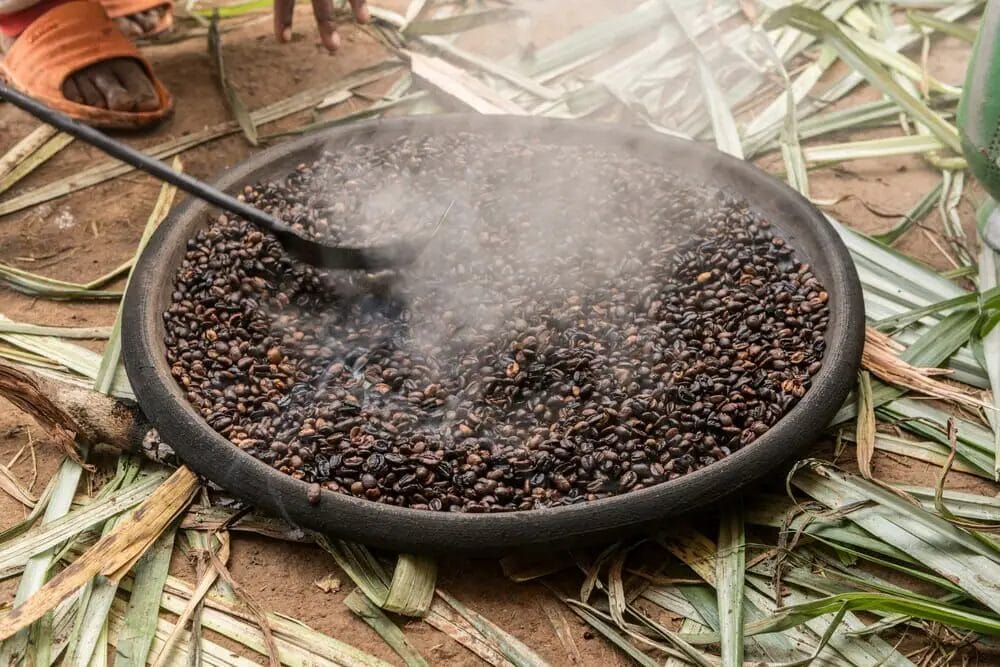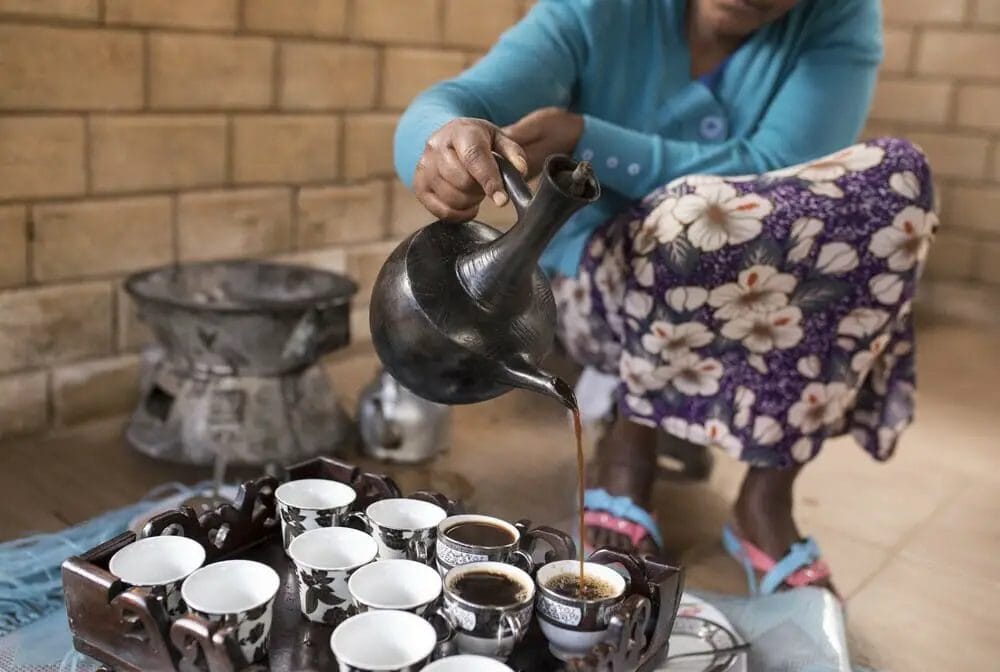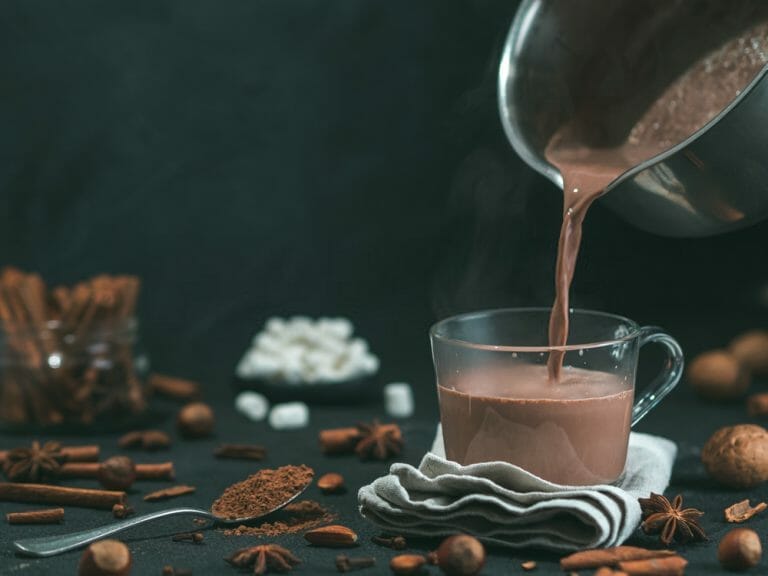Ethiopian Coffee: Everything You Need To Know

If you’re a coffee-lover, you ought to try Ethiopian coffee.
Ethiopia boasts some excellent coffee flavours. Ethiopians produce a diverse range of coffees that vary from light to dark roast and have subtle or intense flavours and notes of fresh fruit and flowers.
There are many different types of coffee from Ethiopia, but they are usually grouped by region, altitude, and quality.
Today, we will take a deeper dive into the country of origin for this particular coffee. We will explore where you can buy a cup of the good stuff, what to expect when you drink it, and why Ethiopian coffee has grown so popular.
Are you ready to become an expert in Ethiopian coffee?
Let’s get started!
What is Ethiopian Coffee?
Ethiopian coffee is a particular type of dark-roasted coffee that has a distinctive taste. It is grown on mountains located in the southern part of Ethiopia, and it’s considered one of the best coffees in the world.

Ethiopian coffee beans are usually roasted longer than most other beans, giving them unique flavours and dark qualities. They're also extremely rich in flavour and one of the best coffees you can taste without grinding.
The History of Ethiopian Coffee
Ethiopia is the fifth largest producer of coffee in the world. Ethiopia relies heavily on the coffee industry for its livelihood. As a result, the globally esteemed beverage has become a chief part of the culture of Ethiopia.
A fascinating mixture of history and legend hides behind the discovery of coffee in Ethiopia.
It is unclear where the legend finishes and history starts, but the vast majority of experts agree that Ethiopia is the only coffee-growing place in the world.
According to a Myth, a goat herder named Kaldi discovered that his goats were eating cherries, which gave them endless energy.
He wanted to know if the cherries made his goats more active. So he took some to a monastery for monks to try.
Fearing the cherries may contain some evil magic, the monks threw them into a fire.
When the monks began to burn incense, they smelled so good that they decided to take them off the fire, ground them, and place them in the water container. Ultimately, it led to the birth of coffee beans in Ethiopia.
Most historians don't believe that Kaldi discovered coffee. Instead, they think that the nomadic Galla tribe is more likely responsible for the discovery of coffee.
Despite a tumultuous political history, Ethiopia has maintained a stable currency. On the whole, 60% of all exports from Ethiopia are coffee.
The Perfect Growing Conditions For Coffee Beans
Ethiopia houses coffee as the birthplace. Coffee trees have been growing tranquil for centuries here. As a result, the environment is perfect for producing excellent coffee.
It means the coffee beans are picked from high-altitude orchards near volcanic soil. Ethiopian coffee beans come in a wide variety of flavours. They grow best in high elevations in the south.
Coffee is grown naturally far away from the sun and among other plants. As a result, most coffees are grown without the usage of agricultural chemicals.
In other areas of the world, coffee farmers have to plant specific types of coffee and create the perfect conditions. As a result, coffee plants grown elsewhere don't produce the same taste or cup-like ones in Ethiopia.
Ethiopian beans’ taste: what is to be expected?
Coffee from Ethiopia is famed for its bright, fruited, and floral flavours. In addition, these coffees typically have high acidity, a light to medium body, and intricate flavour notes.
The beans may be washed or processed naturally. The processing method that the beans go through has a significant effect on the final taste of the coffee.
It gets processed through wet processing, and the fruit mechanically removes right away. As a result, the flavour of these beans is very clean tasting. You can taste the bright, complex notes in each sip.
Naturally processed coffees have fruitiness and a winey tone, complex blueberry notes, bright acidity with a medium to heavy body.
Coffees that are washed can express floral or citrus flavours. They tend to be lighter and drier in taste, too.
Most coffee from Ethiopia is processed with natural methods. This method has been used for many years and hasn't changed much. However, wet processing is a relatively new process. It will continue to change as unique technology becomes available.
Brewing Ethiopian Coffee
There are many ways to brew Ethiopian coffee. Making coffee from Ethiopia at your house – there is no right or wrong way. We will go through some of the popular methods of brewing Ethiopian coffee:
Automatic Drip
Traditional Ethiopian coffee is light-bodied and bright in acidity and tastes best as a filtered coffee. Paper filters will intensify the flavour of coffee, making it more acidic and full-bodied.
Pour Over
For the best results, you should prepare it as a pour-over coffee. This brewing process allows for more control and slows down the brew. In addition, it lets you extract the best flavours of coffee.
Cold Brew
Ethiopian beans are a great coffee to serve cold. Yes, please. Grind coarsely for a cold brew to not over-extract the coffee’s acidity.
You can brew Ethiopian coffee cold. You can also brew it as a pour-over if you want your iced coffee to have more body and sweetness. It all depends on how you brew it.
Make sure to steep the coffee for the best coffee taste. Try brewing Ethiopian coffee with a hand-motorized machine to extract the best flavours from your beans.
How To Roast Ethiopian Beans
The best roasting for beans from Ethiopia is a medium roast. It will result in the best balance of flavours between sweet, bitter, and saltiness.

Many coffee roasters today roast their beans lightly, with an emphasis on flavour clarity. It would yield a tea-like taste and would accentuate its complex flavours.
Black coffee is best for black coffee drinkers because it has high acidity and a light body. Unfortunately, it’s not as good as milk. Nevertheless, you won’t mind drinking decaffeinated coffee black.
The Importance Of The Ethiopian Coffee Ceremony
Coffee is so vital to Ethiopians that they spend hours each day drinking it. The coffee ceremony in Ethiopia is a form of social connection. To be invited is a sign of respect and friendship.
Coffee plays such an essential part in Ethiopian culture that it appears in many expressions dealing with life, food, and interpersonal relationships.
Buna Dabo naw is a common saying that translates to “coffee is our bread”.
The house owner gives guests a shot of coffee called "Yirgacheffa," which is made with gesho beans and has a tart, citrusy, sweet taste. It is usually drunk when you have arrived at the reception.
The Yirgacheffe is considered a sun and moon drink because it looks like a sun (a small round ball) and tastes like a moon (sweet).
The traditional ceremony lasts for at least 2 hours. It consists of a 45-minute talk about the coffee, its history, and a demonstration of how to make it.
The goal of the ceremony is to provide a platform for communication and discussion. It also allows everyone to interact with one another, especially people from different social classes.
The coffee ceremony serves as a chance for everyone to feel welcome in the community.
How do Ethiopians make coffee step by step?
This is how Ethiopians make coffee step by step:
Gather water, green beans and coffee beans.
Boil water (caffeine-free).
Add the beans to the boiling water and boil it for 4 minutes.
Remove from the flame, let it stand for a few minutes.
Strain the coffee into a pot or bowl.
Is Ethiopian coffee the best in the world?
Ethiopian coffee is the best in the world, with a rich history and heritage of producing the most flavorful coffee beans. Ethiopian coffee is best when it’s fresh and is brewed right. Ethiopian coffee can be brewed in many ways: hot, cold, black or with milk.
Is Ethiopian coffee healthy?
Ethopian coffee is healthful for those who enjoy it. It’s not good for pregnant women or people taking heart medicine. Coffee has a mild caffeine effect, which can cause headaches, insomnia and nausea in some people.
Is Ethiopian coffee high in caffeine?
Ethiopian coffee has a medium caffeine content. Sometimes, it’s brewed in a very strong way. This can cause people to have problems sleeping because they drank too much coffee too soon. But, many of the people who like Ethiopian coffee enjoy it cold rather than hot and they let it sit for a while. Coffee should be enjoyed in moderation
How many types of coffee are there in Ethiopia?
There are many types of Ethiopian coffee. There is Aricha, which is also known as bohe and Yirgacheffe.
What does Ethiopian coffee smell like?
Ethiopian coffee smells like grapes, strawberries, and lemons. It’s a very fruity smell that people often describe as “heavenly.”
Is Ethiopian coffee sour?
Ethopian coffee is made with natural ingredients, which are acidic. So the beverage has a sour taste to it. But it’s not very sour; the definition of sour is “very tart” or “very acidic.” Ethiopian coffee doesn’t have that sour taste that can make you feel bad after drinking it
Final thoughts
Coffee is a big part of Ethiopian culture. It’s often considered to be the “Redeemer.” Through tradition, coffee has become a way of connecting people who share their daily lives.
It's believed that by drinking coffee together, Ethiopian culture is preserved for future generations.
Ethiopia is known for its coffees and teas. So it’s not a surprise that people in Ethiopia know how to brew the most delicious cups of coffee.
I hope this article has helpful to you in knowing the Ethopian Coffee. Let us know your thoughts in the comment section.
FAQs
Why is coffee from Ethiopia important?
Ethiopian coffee is vital for many reasons, the main one being it’s delicious. Ethiopian coffee comes from a rich history and hasn’t changed much since its origins.
But, unfortunately, it's a rare commodity in today's world of coffee production.
What makes Ethiopian beans unique?
Ethiopian beans are known for their unique flavours and characteristics that stand out from the rest of the world.
Ethiopian beans are known for their wide variety of flavours. Their unique taste makes them some of the most popular bean coffees in the world.
These are some of the most flavorful beans in the world. It is why Ethiopia is famous for its coffees and teas. Ethiopian coffee beans have a medium body with a little bit of acidity, making them truly one-of-a-kind.
What is the Best Ethiopian Coffee Available Today?
There are many great options for Ethiopian coffee. It all depends on your taste and whether you want to brew it hot or cold. Some of the best Ethiopian coffee available is:
• Sidamo coffee
• Harrar coffee
• Yirgacheffe coffee
This Yirgacheffe coffee that Volcanica sells is prevalent. People like it because the beans are grown and cultivated by hand. They have a medium body, high acidity, and a fruity and wine-like flavour.
Their aroma is described as “cinnamon with strawberry undertones.”
Ethiopian coffee is often touted for its delicious taste. Yirgacheffe is one of the best places to start learning about what Ethiopian coffee is all about. Start here if you want to try Ethiopia's best coffee.
The Harrar and Sidamo coffees are also delicious. Be sure to check out Volcanica Coffee!






